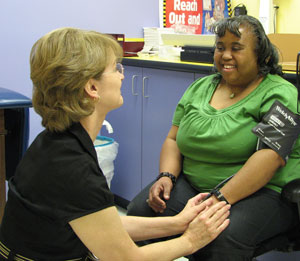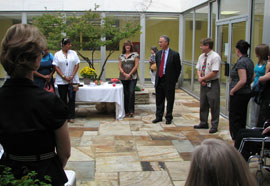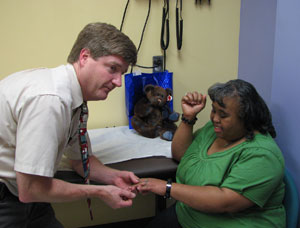UAB’s Adult Down Syndrome Clinic Reaches a Milestone
By Bob Shepard |
Adult Down Syndrome Clinic patient Ingrid Kidd gets a blood pressure check from nurse Sharon Hamilton |
“Children’s hospitals, pediatricians, and our medical system have done such a wonderful job in caring for children with Down syndrome that many are now living into their 40s, 50s, or older,” says Edward J. Lose, M.D., assistant professor in the UAB Department of Genetics. Lose is leading UAB’s response to that challenge, as director of the innovative UAB Adult Down Syndrome Clinic, one of the few clinics of its type anywhere in the United States.
The clinic provides services related to patients’ Down syndrome, “but we also make recommendations for general adult conditions they may be facing — from a serious illness to a bout with a common cold,” Lose says. Adult Down patients often have issues with sleep apnea, obesity, hearing and vision loss, thyroid problems, and vitamin D deficiencies, Lose explains. Aging seems to be accelerated.
 |
Clinic patients and staff celebrate a milestone visit |
Continuing Care
Lose says many Down patients do have their own primary-care physicians and receive excellent care, although that’s more likely to be the case in metropolitan communities such as Birmingham than in rural areas of the state.“For those patients with a primary-care doctor, our clinic is designed simply to help treat facets of their Down syndrome,” says Lose. “But for those without a primary-care physician, we can facilitate getting them tied in with one and finding the needed specialists.”
Ingrid Kidd has a good primary-care physician in Columbiana, but the comprehensive and thorough nature of the UAB clinic appealed to her family. On the day of her recent visit, Ingrid was seen by occupational and physical therapists, a nutritionist, a family physician, and Lose. Other specialists available as needed through the clinic include speech/language pathologists, audiologists, and social workers. A psychiatric evaluation is available when necessary.
New Health Issues
While Ingrid was at the clinic for the first time, Peter Watson was there for his fourth visit. Peter is 62, although he looks older. He’s now in a wheelchair, which presents a new set of health issues for his caregivers.“He used to be quite active, quite the dancer, until a few years ago,” says Julia Copeland, his sister and caregiver.
 |
Clinic director Edward Lose examines Ingrid |
Lose says the clinic, held two days a week, sees patients from Alabama and surrounding states. It is funded by a grant from the UAB Health Services Foundation and the generosity of the parent support group Parent Advocates Down Syndrome (PADS). The John Mark Stallings Fund recently was established to endow the clinic and sustain funding.
“We’re excited to have now reached our 100th patient,” says Lose. “It’s a significant milestone, but there are a great many more people with Down syndrome in Alabama and the surrounding region who could benefit from our services. We just have to reach them.”